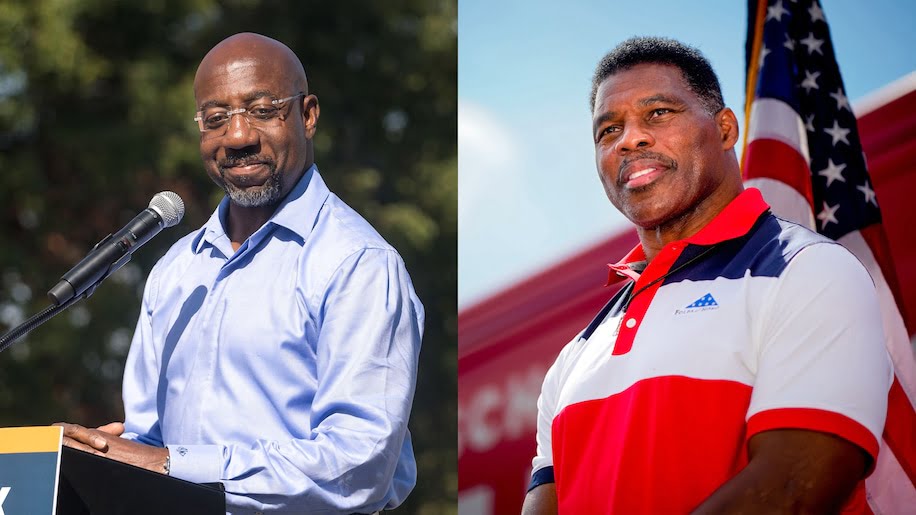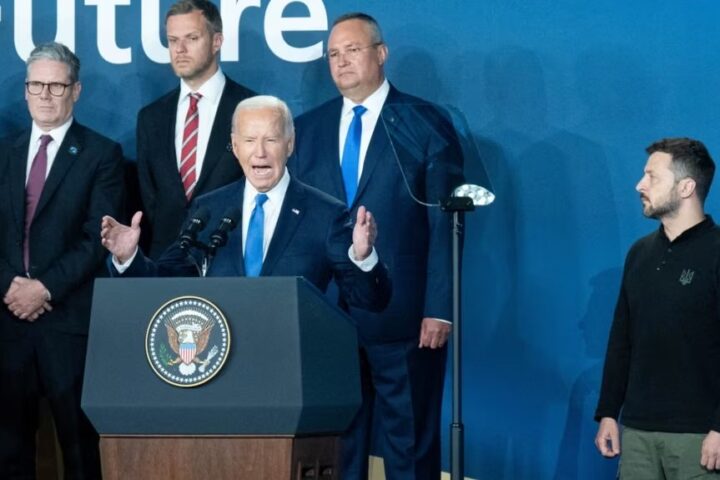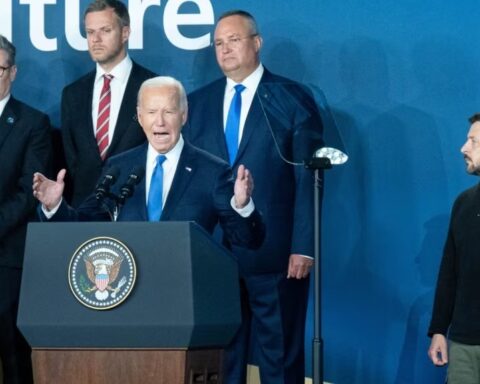Today, Sen. Raphael G. Warnock (D-Ga.) and Republican challenger Herschel Walker, the former football star, face off in one of the most anticipated debates in the midterm elections — a race that could tip the balance of party control in the U.S. Senate.
The evening encounter in Savannah, Ga., is the latest in a string of debates in marquee Senate races, including one Thursday night in Wisconsin that quickly turned personal between Sen. Ron Johnson (R-Wis.) and Democratic challenger Mandela Barnes.
Meanwhile, former president Donald Trump on Friday lambasted the House select committee investigating the Jan. 6, 2021, attack on the Capitol but was silent in a letter to its chairman about whether he would comply with a subpoena to testify. President Biden is in California, where he will hold an event focused on prescription drug prices.
Herschel Walker abortion allegations test just how far partisan loyalty can stretch
In a fittingly odd capstone to a political season dominated by the debate over abortion, control of the Senate may turn on how many Georgia Republicans stick with Herschel Walker despite strong evidence that 13 years ago, he paid for his then-girlfriend to terminate a pregnancy and two years later pressured her to do so again.
In a party that advocates abortion bans — Walker has called for making the procedure illegal with no exceptions — that might seem a tough sell.
But as we’ve repeatedly seen, in today’s hyperpartisan environment, personal scandal isn’t what it used to be.
Just as most Republicans brushed aside then-candidate Donald Trump‘s boasts about sexual assault when the Access Hollywood tapes surfaced during the 2016 campaign, many party leaders have rallied around Walker since the abortion allegations became public this month. This week, two Republican senators, Rick Scott of Florida and Tom Cotton of Arkansas, campaigned with the former Georgia football star in a show of solidarity. Most Republican voters will almost surely stick with the team.
But a huge — maybe election-altering — gap separates “most” from “all.”
Georgia is one of the most closely divided states in the country. When he won a runoff election in January 2021, incumbent Democratic Sen. Raphael Warnock prevailed by two percentage points, and polls this year have consistently pointed to a tight race once again. To win, Walker needs a united party behind him. The abortion allegations, therefore, loom as a critical test of just how far partisanship will go.
A tipping point state
The answer matters nationally because Georgia, along with Nevada and Pennsylvania, is one of three states that likely will decide control of the Senate. Republicans almost certainly need to win two of the three to gain a majority. Democrats have a few other races in which they have a shot at winning a Republican-held seat — in Ohio, North Carolina and Wisconsin — but each of those states leans more Republican than the three closest.
While Walker has already faced problems because of his personal conduct — an ex-wife, for example, alleges he once held a pistol to her head, and he’s made a number of false statements about his record — the accusation of paying for an abortion added a new, highly charged issue in the final weeks of his campaign against Warnock, the senior pastor of Atlanta’s Ebenezer Baptist Church. The two are scheduled to conduct their only debate Friday evening.
To recap: The woman making the allegations against Walker says the two had an intimate relationship for several years. When she became pregnant in 2009, he pressured her to have an abortion. She was unemployed at the time, didn’t have the money for the procedure and asked him to pay for it, she says. She also says that when she became pregnant a second time two years later, Walker again told her to have an abortion. She refused that time and had the child. He eventually agreed to pay child support for her son, now 10, after she sued him, according to court records in New York.
To back her account, the woman, whose name has not been publicly reported, has produced a bank deposit slip with a photocopy of a check from Walker, a receipt from the abortion clinic, a get well card Walker signed and the corroborating account of a person in whom she confided at the time.
Walker has issued several conflicting denials — first saying he didn’t know who the woman was, then, after news reports that she was the mother of one of his children, shifting to say that “I send money to a lot of people” and that he knew nothing about an abortion.
Some of Walker’s supporters justify continuing to back him by saying they distrust the media that have reported the claims — in addition to the Daily Beast, which initially reported the story, the New York Times and the Washington Post have talked with the woman involved, each adding some additional details.
Other supporters claim that Walker is a different person now than a decade ago. Still others have justified supporting him by saying that regardless of what he’s done in his personal life, Walker would vote to ban abortions, while Warnock would not.
Republican leaders, however, have been open about a more straightforward partisan motivation.
“I think we’re going to stick with Walker … we’re going take it all the way to the end,” Sen. Mitch McConnell of Kentucky, the Republican Senate leader, told CNN in an interview aired Tuesday. “I think they’re going to hang in there and scrap to the finish.”
“I don’t have a litmus test,” McConnell added in describing his approach to elections. “I’m for people that get the Republican nomination — and for winning — because if we win, we get to decide what the agenda is, and they don’t.”
McConnell and his colleagues have had to fall back on that sort of justification a lot in recent years, excusing — or at least averting their eyes from — a long list of bad acts by their candidates.
Democrats have sought to take advantage of that, claiming the moral high ground, as White House Press Secretary Karine Jean-Pierre did this week in relaying President Biden‘s position that Los Angeles City Council members caught on tape making racist remarks should resign.
“Here’s the difference between Democrats and MAGA Republicans,” Jean-Pierre said. “When a Democrat says something racist or antisemitic, we hold Democrats accountable. When a MAGA Republican says something racist or antisemitic, they are embraced by cheering crowds.”
That claim of moral superiority doesn’t quite hold, however. Republicans have certainly had many more incidents to apologize for in recent years than Democrats have had. But Democrats haven’t had their principles tested by a high-stakes case.
Members of the L.A. City Council who step down, like Nury Martinez, who resigned Wednesday, will be replaced by another Democrat. The same was true in 2017 when Democrats pushed Sen. Al Franken of Minnesota to resign after allegations of sexual harassment: Democrats knew their party would keep the Senate seat.
How Democrats would act if they had to choose between principles and partisan advantage remains to be seen.
At the same time, while it’s fashionable see McConnell’s sort of win-at-all-costs mentality as all-pervasive and to declare that “nothing matters” to voters other than partisanship, that’s not true, either.
Even before the abortion allegation became public, for example, Walker was running significantly behind the pace set by the Republican at the top of the statewide ticket, Gov. Brian Kemp.
A poll released Wednesday from the University of Georgia, for example, echoed other recent surveys that showed Kemp ahead of Democratic candidate Stacey Abrams by a large margin while Walker and Warnock were in a tight race. The University of Georgia poll, which was completed just as the abortion story became public, found Warnock holding a nominal 46%-43% edge, within the poll’s margin of error, while Kemp led 51%-41%.
About 9% of Kemp voters backed Warnock, the poll found.
Other polls taken since the abortion allegation became public have shown a slight decline in Walker’s support — on average, it’s down about a point compared to where his vote stood before the news broke.
Some Republicans could decide simply to skip the Senate race, others might vote for a third-party candidate, Libertarian Chase Oliver, who had 4% in the University of Georgia poll.
Oliver, although little known, may play an outsized role in this drama. Under Georgia law, if no candidate gets 50% of the vote — highly possible in a close race with three candidates — the top two go to a runoff. That’s what happened two years ago, and it may well happen again, meaning that the final verdict on the abortion allegation may wait for a Dec. 6 second round, potentially with control of the Senate in the balance.

















